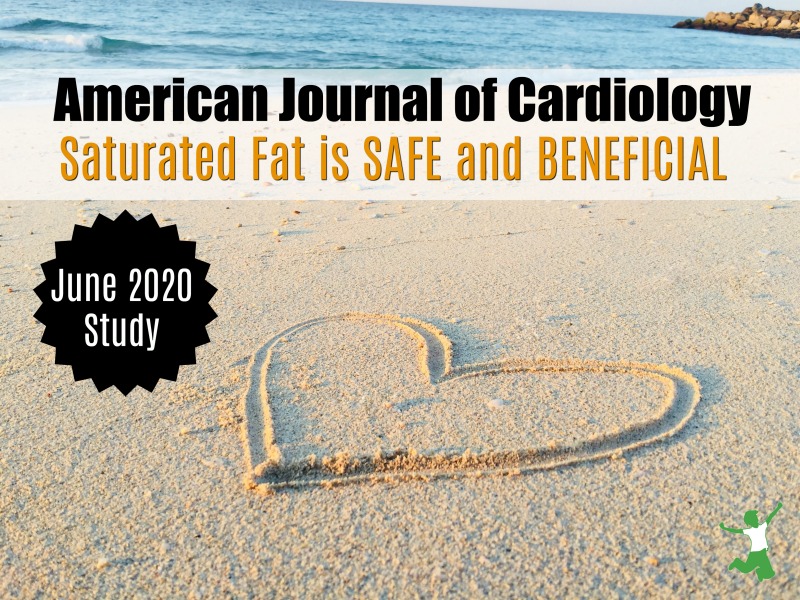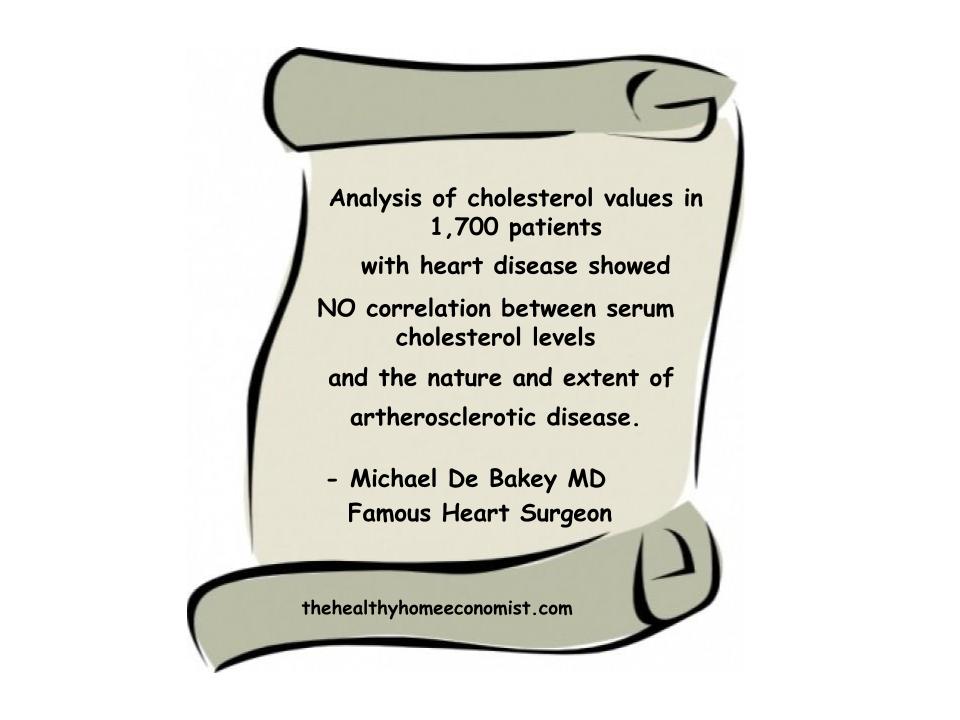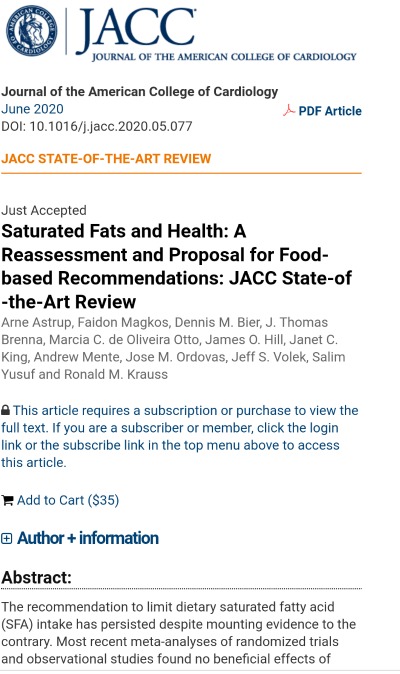The independent, peer-reviewed Journal of the American College of Cardiology publishes a comprehensive meta-analysis of randomized trials and observational studies in June 2020 that declares saturated fat is safe and that its consumption reduces stroke risk.
The independent, peer-reviewed Journal of the American College of Cardiology has just accepted a comprehensive study for publication in its June 2020 edition entitled “Saturated Fats and Health: A Reassessment and Proposal for Food-based Recommendations”. (1)
In a nutshell, this meta-analysis of randomized trials and observational studies found no beneficial effects of reducing saturated fats on cardiovascular disease and total mortality.
Instead, the scientists found a protective effect of saturated fat consumption against stroke.
Why has the misguided, downright HARMFUL recommendation against saturated fats persisted for DECADES despite the mounting evidence to the contrary?
There are likely many reasons why…chief among them being, you guessed it, cha-ching for the edible oil companies who make billions every year making low quality, inferior replacements for butter, eggs, cream and other healthful, natural sources of saturated fats in the diet.
What About Saturated Fats Increasing LDL?
Some of you in the medical field may be initially confused by this study, as some studies suggest that saturated fat intake can increase low-density lipoprotein (LDL)-cholesterol, the so-called “bad” cholesterol.
According to the study authors, this is not problematic for the following reason:
Although SFAs increase low-density lipoprotein (LDL)-cholesterol, in most individuals, this is not due to increasing levels of small, dense LDL particles, but rather larger LDL which are much less strongly related to CVD risk.
The authors also noted that the effects of saturated fats in the diet cannot be predicted in a vacuum. The overall macronutrient distribution must be considered.
They concluded that:
Whole-fat dairy, unprocessed meat, eggs and dark chocolate are SFA-rich foods with a complex matrix that are not associated with increased risk of CVD. The totality of available evidence does not support further limiting the intake of such foods.

It’s Been a Long Time Coming!
As someone who has strokes galore in my family tree, I sure am glad I ignored conventional dietary advice for the past 3 decades, eating my fill of butter, cream, eggs, full-fat dairy, and the tasty saturated fats around my grass-fed steaks.
While I knew at the time that the prevailing “wisdom” about saturated fats was 100% wrong, what I didn’t know is that consuming them would actually lower my risk for stroke!
It just goes to show how LONG dietary myths can persist once they take hold in the public’s mind…it can take many years to dispel the prevailing “wisdom” even if it is totally and utterly wrong.
Takeaway? Question everything and take no “nutritional dogma” at face value. Always research both sides and come to your own conclusions.
Experts Speaking the Truth Repeatedly Attacked in the Media
Dr. Dwight Lundell MD, a cardiologist who has been viciously and repeatedly attacked by mainstream media for many years, was one of the first experts in the field to blow the whistle on the saturated fats cause heart disease scam.
As a heart surgeon who performed over 5,000 open heart surgeries, Dr. Lundell warned many years ago that the notion that saturated fats are unhealthy is wrong. Not only is it completely and utterly wrong, but Dr. Lundell goes so far as to say that avoiding saturated fats is scientifically and morally indefensible.
By following the recommended low-fat diet, Dr. Lundell warned that people are unknowingly causing “repeated injury to their blood vessels”. This repeated injury, day in and day out, is what is causing rampant inflammation across all population groups which has resulted in the epidemic of heart disease, diabetes, and obesity.
What Else are the “Experts” Wrong About?
What else about conventional dietary advice is also wrong, you might wonder?
How about pretty much ALL of it!
If you want to truly be healthy, examine the ancestral diets of vibrant, chronic-disease free societies, and notice how drastically they deviate from today’s accepted nutritional wisdom.
Hint: not one of them was plant-based! Blue Zones is 100% baloney and the China Study is loaded with flaws.

Reference
(1) Saturated Fats and Health: A Reassessment and Proposal for Food-based Recommendations (Journal of the American College of Cardiology, June 2020)








Really Informative Post Thanks for sharing
well said
Hi Sarah,
Thanks for this post. I took this info to my doctor yesterday and he immediately noted that the journal is a prestigious one. I wanted him to read it since my LDL is usually a little high but my HDL is very good. I’ve gotten flack about it in the past and was told for years to do low fat. Do you have any information on what are acceptable levels of TOTAL/saturated fat per day for women (particularly post-menopausal) but info in general would be appreciated.
Thanks very much!
Cary
So what would you suggest to someone with high triglycerides and high LDL?
Hello Sarah,
This article appears to be peer-reviewed:
“A review of fatty acid profiles and antioxidant content in grass-fed and grain-fed beef.”
It is found here:
https://link.springer.com/article/10.1186/1475-2891-9-10
Here is an excerpt. Note that omega-3 and omega-6 are also expressed as n-3 and n-6:
“For instance, cattle fed primarily grass significantly increased the omega-3 content of the meat and also produced a more favorable omega-6 to omega-3 ratio than grain-fed beef [46, 55–57].
Table 2 shows the effect of ration on polyunsaturated fatty acid composition from a number of recent studies that contrast grass-based rations to conventional grain feeding regimens [24–28, 30, 31]. Grass-based diets resulted in significantly higher levels of omega-3 within the lipid fraction of the meat, while omega-6 levels were left unchanged. In fact, as the concentration of grain is increased in the grass-based diet, the concentration of n-3 FAs decreases in a linear fashion. Grass-finished beef consistently produces a higher concentration of n-3 FAs (without effecting n-6 FA content), resulting in a more favorable n-6:n-3 ratio.
The amount of total lipid (fat) found in a serving of meat is highly dependent upon the feeding regimen as demonstrated in Tables 1 and 2. Fat will also vary by cut, as not all locations of the carcass will deposit fat to the same degree. Genetics also play a role in lipid metabolism creating significant breed effects. Even so, the effect of feeding regimen is a very powerful determinant of fatty acid composition.”
Of course it stands to reason that the meat of grass-fed cows has more omega-3, because omega-3 comes from green plants in the first place: grass for cows and algae for fish. Good sources for humans are green-leafy plants (spinach, chard, turnip greens, etc.), flaxseed, and walnuts.
The saturated fat of modern grain-fed animals is very different from the saturated fats of traditional societies where the animals ate grass. That meat also contained omega-3 fats, and vitamin K2. These attributes may have been protective against cardiovascular disease. But modern meat lacks omega-3 and K2. Without these protective nutrients, the vast amount of unbiased research has shown it to be harmful to the cardiovascular system, as well as plant oils, especially when removed from the foods in which they are naturally found. The research of Caldwell Esselstyn has demonstrated this. It remains that the only diet ever clinically shown to reverse heart disease is a very low fat plant diet, and that includes low or no plant oils too.
Plant oils, the types in bottles, even olive oil, have been shown to harm the epithelium, that is the inner lining of the cardiovascular arteries. And saturated fat has been shown in study after study after study to harm the cardiovascular system and lead to earlier death. But the studies have been done on the modern saturated fats from grain fed, confined animals. In both cases–plant oils removed from the plants and grain-fed confined animals–the underlying principle is the same: when nature is tampered with, harm can be expected.
Do you have a reference for this that is peer-reviewed? If I recall correctly, the Weston Price Foundation did testing awhile back that showed no more omega-3 fats in grassfed beef than grain fed beef. Omega-3 fat isn’t saturated fat, by the way. Omega-3 fats are polyunsaturated…only needed in very small amounts, but still needed nonetheless.
Not that I’m disputing that grassfed meat is the same as grain fed .. it’s not. It’s just that getting more omega-3 fats is not the biggest reason to eat it!
Glad to hear this, but doesn’t saturated fat cause inflammation, or is that wrong, too?
Thanks
Kirk
Saturated fat does not cause inflammation. On the other hand, polyunsaturated fats most definitely do cause inflammation when consumed in excess which is, ironically, exactly what people are doing trying to misguidedly avoid saturated fats.
Great information, I hope it changes people’s minds because like you mentioned in your blog it’s difficult to change what people believe for long. When research has shown that saturated fat is not good I think more awareness should be created about this so that people start accepting this fact that saturated fat is not that bad to consume. Thanks
Study paid for by commercial beef and dairy. I would question the results.
So, what you’re basically saying is all research is bogus then? Yes, someone has to fund the study. Researchers aren’t going to work for free! The bottom line is that the study was chosen to be published in an independent, peer reviewed journal. So, third-party, objective sources confirmed the findings that are independent of the source of the funding.
So informative article. I agree that it takes many years to get one wrong thought out of public mind once it gets prevailed. And if anybody gives true research people ignore him and not believe him because they just want to believe what is prevailing. I hope people start taking saturated fat instead of cutting them from their diet.
Thanks for sharing the worth reading article.
This is great news! But have you seen any other media sources / links that corroborate this or has it not yet been reported anywhere else? I googled it but couldn’t find any. I’d like to post this on my social media but would prefer there to be more back-up so it looks more convincing to others.
Since it is a meta-analysis, the study covers many other studies (both randomized and observational), so if you dig into that study, it will list the many other studies that it covers from previous years, that were, of course, by and large ignored by mainstream media as they tend to water down or not report anything that is detrimental to Big Pharma, Big Ag or Big Food profits. 🙂